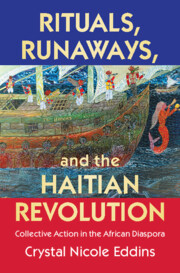Rituals, Runaways, and the Haitian Revolution
The Haitian Revolution was perhaps the most successful slave rebellion in modern history; it created the first and only free and independent Black nation in the Americas. This book tells the story of how enslaved Africans forcibly brought to colonial Haiti through the trans-Atlantic slave trade used their cultural and religious heritages, social networks, and labor and militaristic skills to survive horrific conditions. They built webs of networks between African and ‘creole’ runaways, slaves, and a small number of free people of color through rituals and marronnage — key aspects to building the racial solidarity that helped make the revolution successful. Analyzing underexplored archival sources and advertisements for fugitives from slavery, Crystal Eddins finds indications of collective consciousness and solidarity, unearthing patterns of resistance. Considering the importance of the Haitian Revolution and the growing scholarly interest in exploring it, Eddins fills an important gap in the existing literature. This title is also available as Open Access on Cambridge Core.
Crystal Nicole Eddins is Assistant Professor in the Department of Africana Studies at the University of North Carolina at Charlotte. Her research has been supported by the Ruth J. Simmons Postdoctoral Fellowship, the John Carter Brown Library, and the National Science Foundation.

